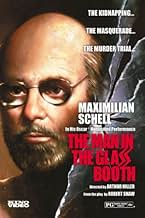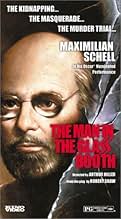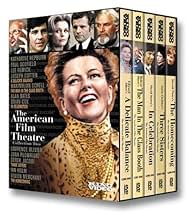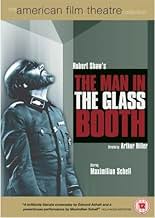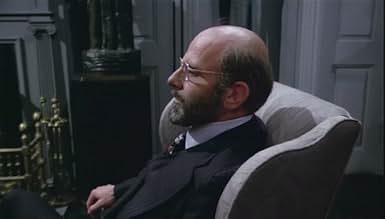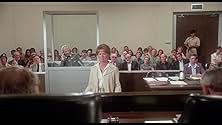IMDb-BEWERTUNG
7,0/10
1706
IHRE BEWERTUNG
Füge eine Handlung in deiner Sprache hinzuMossad agents kidnap an American Jewish man, accuse him of being a fugitive Nazi war criminal and take him to Jerusalem to face trial for genocide.Mossad agents kidnap an American Jewish man, accuse him of being a fugitive Nazi war criminal and take him to Jerusalem to face trial for genocide.Mossad agents kidnap an American Jewish man, accuse him of being a fugitive Nazi war criminal and take him to Jerusalem to face trial for genocide.
- Regie
- Drehbuch
- Hauptbesetzung
- Für 1 Oscar nominiert
- 3 Nominierungen insgesamt
Leonidas Ossetynski
- Samuel Weinberg
- (as Leonidas Ossettynski)
Empfohlene Bewertungen
10zenda
This is my all-time favorite film. Maximilian Schell's Oscar-nominated performance completely dominates everything else on the screen. His long courtroom speeches are both disturbing and riveting. This is based on a book and play by Robert Shaw, who'll you'll probably remember as an actor from "The Sting", "Jaws" and "A Man for All Seasons". He disowned the movie version because of changes made. It has been too many years since I've seen the film, but I have re-read both book and play this month. I think a significant change to Col. Dorff's heritage was probably his objection. While I see his point, I think he overreacted. The film itself is a bit slow moving and everyone else is overpowered by Mr. Schell's breathtaking performance. But those flaws didn't kick in for me until I had seen the film a dozen or more times. It is a must see for Maximilian Schell's work- one of the greatest performances ever filmed.
Nice film with magnificent performances about a successful Jew who is kidnapped by Mosad to respond his crimes .It deals with a wealthy Jewish businessman is suspected of being a Nazi war criminal.
This is a retelling of a novel written by actor Robert Shaw, from whose credits he requested his name be removed, and it was adapted as a play by prestigious playwright Harold Pinter who also carried it to stage at a Broadway theater. It works up a certain weight in its exploration of interesting issues as wrong accusation, guilt, responsability and forgiveness .This one belongs to American Film Theater in which it tries to embalm theatrical interpretations. Being freely based on the life of Otto Adolf Eichmann, the picture depicts the arrest and subsequent trial of the former Nazi by the Israelies accused of being a former Nazi concentration commandant. The film's title is derived from the fact that Eichmann sat in glass booth during his trial. And his character has been also adapted in The trial of Adolf Eichman 1997, Eichmann 2007 by Robert Young with Thomas Kretschmann, Franca Potente, Stephen Fry and Hanna Arendt 2012 by Margarette Van Trotta with Barbara Sukowa, Julia Jentsch, Jane McTeer. Cast and support cast provide terrific acting, but it still emerges as stagily verbose. Starring Maximiliam Schell gives a fabulous performance, he delivers a self-indulgent playing, though overacting, at times. He is welll accompanied by a pretty support cast as Louis Nettleton as a prosecutor, Luther Adler as a Judge, Leonard Cimino as a witness, Henry Brown, Lawrence Pressman, among others.
The motion picture with adequate cinematography by Sam Leavitt, being professionally directed by Arthur Hiller. He was a good professional with long career and life, as he died at 93. Hiller directed all kinds of genres with penchant for dramas and comedies. Including important films with the greatest actors, such as : The Americanization of Emily, The miracle of the white stallions, Promise her anything, Plaza suite, Man of La Mancha, The in-laws, Making Love, Tobruk, Silver streak, Nightwing, Author author, Teachers, Outrageous fortune, The lonely guy, See no evil hear no evil, Taking care of business, The babe, among others .Rating 7/10 .Well worth watching. Better than average
This is a retelling of a novel written by actor Robert Shaw, from whose credits he requested his name be removed, and it was adapted as a play by prestigious playwright Harold Pinter who also carried it to stage at a Broadway theater. It works up a certain weight in its exploration of interesting issues as wrong accusation, guilt, responsability and forgiveness .This one belongs to American Film Theater in which it tries to embalm theatrical interpretations. Being freely based on the life of Otto Adolf Eichmann, the picture depicts the arrest and subsequent trial of the former Nazi by the Israelies accused of being a former Nazi concentration commandant. The film's title is derived from the fact that Eichmann sat in glass booth during his trial. And his character has been also adapted in The trial of Adolf Eichman 1997, Eichmann 2007 by Robert Young with Thomas Kretschmann, Franca Potente, Stephen Fry and Hanna Arendt 2012 by Margarette Van Trotta with Barbara Sukowa, Julia Jentsch, Jane McTeer. Cast and support cast provide terrific acting, but it still emerges as stagily verbose. Starring Maximiliam Schell gives a fabulous performance, he delivers a self-indulgent playing, though overacting, at times. He is welll accompanied by a pretty support cast as Louis Nettleton as a prosecutor, Luther Adler as a Judge, Leonard Cimino as a witness, Henry Brown, Lawrence Pressman, among others.
The motion picture with adequate cinematography by Sam Leavitt, being professionally directed by Arthur Hiller. He was a good professional with long career and life, as he died at 93. Hiller directed all kinds of genres with penchant for dramas and comedies. Including important films with the greatest actors, such as : The Americanization of Emily, The miracle of the white stallions, Promise her anything, Plaza suite, Man of La Mancha, The in-laws, Making Love, Tobruk, Silver streak, Nightwing, Author author, Teachers, Outrageous fortune, The lonely guy, See no evil hear no evil, Taking care of business, The babe, among others .Rating 7/10 .Well worth watching. Better than average
As has been said in some of my reviews for the other twelve films making up the American Film Theatre series, the American Film Theatre series was an interesting and ambitious project but was also uneven. None of the thirteen films are terrible, one was close to though, but only three are great. 'The Man in the Glass Booth' was also seen as it was written by actor Robert Shaw and to see whether the Oscar nomination (the only performance in the American Film Theatre that was nominated for an Oscar) for Maximillian Schell was deserved.
My conclusions were that Schell's nomination was worthy, but it was a case of the performance being much better than the film itself (same with the subject matter being better than the film). Which left me intrigued but also a little cold. 'The Man in the Glass Booth' is not one of the worst of the American Film Theatre films, it's a lot better than 'Rhinoceros' and particularly 'Jaques Brel is Alive and Well and Living in Paris'. It is also not one of the best, it's no 'The Iceman Cometh', 'The Homecoming' or 'Butley'. Would put it somewhere bang in the middle.
Schell, the heart and soul of 'The Man in the Glass Booth', is extraordinary in the lead role. All the acting in fact is very good, though the rest of the cast are never on the same level as Schell. The second half is a lot better than the first half, with most of the second half being riveting and tension filled.
'The Man in the Glass Booth' is nicely filmed and the setting is simple and intimate without being too stifling. There is some thought-provoking and sincere writing.
However, 'The Man in the Glass Booth' had potential to be a lot better, especially considering the subject and the lead performance. The first half as indicated isn't as involving as the second. Parts are on the sluggish side while the writing is not as natural and can be mannered. While liking the second half a lot, the twist is somewhat contrived.
Furthermore the action was too confined and static. Arthur Hiller's direction has moments, but tended to be undistinguished and in need of more subtlety.
Concluding, definitely worth a one time watch but didn't blow me away. 6/10.
My conclusions were that Schell's nomination was worthy, but it was a case of the performance being much better than the film itself (same with the subject matter being better than the film). Which left me intrigued but also a little cold. 'The Man in the Glass Booth' is not one of the worst of the American Film Theatre films, it's a lot better than 'Rhinoceros' and particularly 'Jaques Brel is Alive and Well and Living in Paris'. It is also not one of the best, it's no 'The Iceman Cometh', 'The Homecoming' or 'Butley'. Would put it somewhere bang in the middle.
Schell, the heart and soul of 'The Man in the Glass Booth', is extraordinary in the lead role. All the acting in fact is very good, though the rest of the cast are never on the same level as Schell. The second half is a lot better than the first half, with most of the second half being riveting and tension filled.
'The Man in the Glass Booth' is nicely filmed and the setting is simple and intimate without being too stifling. There is some thought-provoking and sincere writing.
However, 'The Man in the Glass Booth' had potential to be a lot better, especially considering the subject and the lead performance. The first half as indicated isn't as involving as the second. Parts are on the sluggish side while the writing is not as natural and can be mannered. While liking the second half a lot, the twist is somewhat contrived.
Furthermore the action was too confined and static. Arthur Hiller's direction has moments, but tended to be undistinguished and in need of more subtlety.
Concluding, definitely worth a one time watch but didn't blow me away. 6/10.
The late Austrian actor Maximilian Schell first came to prominence in Hollywood in a supporting role as Nazi Marlon Brando's superior officer in the WWII epic THE YOUNG LIONS (1958); eventually, he became an international film star upon winning the Best Actor Oscar for Stanley Kramer's star-studded indictment of Nazi war crimes, JUDGMENT AT NUREMBERG (1961) which, despite the sheer brilliance of his performance, was a somewhat surprising accolade given that he was competing against Paul Newman's iconic characterization of Fast Eddie Felson in THE HUSTLER! Interestingly enough, two of Schell's future Oscar nominations also dealt with Nazism, namely THE PEDESTRIAN (1973; which Schell also directed) and the film under review which garnered him his second Best Actor nod. Once again, he came against an iconic performance – Jack Nicholson's Randle P. McMurphy in ONE FLEW OVER THE CUCKOO'S NEST – but lost out to it this time around; for the record, I have just came across the obscure GIVE'EM HELL HARRY which was the only Best Actor (James Whitmore) nominee from that same year which was still eluding me...
THE MAN IN THE GLASS BOOTH is the fourth of 14 productions from The American Film Theater that I have watched – following Lindsay Anderson's IN CELEBRATION (1975), Guy Green's LUTHER (1974) and Joseph Losey's GALILEO (1975) which more than anything sought to record and preserve renowned pieces of theatre that often featured notable actors. In this case, Arthur Hiller transposes Robert Shaw's play about a Jewish industrialist afflicted by the delusion of being a notorious Nazi officer; this controversial ruse undeniably elicits comparisons with THE RULING CLASS (1971) where Peter O'Toole's mad aristocrat first thinks he is Jesus Christ but then morphs into Jack The Ripper by the end of the film! Curiously enough, Shaw initially objected to Edward Anhalt's s adaptation of his material and asked to have his name removed from the film's opening credits; after watching it, however, he relented and agreed to put it back on but by then it was too late and, indeed, his name does not appear anywhere in the film's opening credits, In any case, there seems to have been no animosity between the two multi-talented actors as Schell eventually directed Shaw in END OF THE GAME (1975) and they co-starred in Shaw's untimely swan song AVALANCHE EXPRESS (1979).
Given the film's title, source of origin and subject matter, I was under the impression that the film would be entirely taken up by the trial which, when it actually comes on in the second half Is indeed riveting – with concentration camp survivors brought face to face with their tormentor; members of the aggrieved public rising from their seats to beat him up following his latest animated diatribe; Schell's own doctors 'confirming' his identity until one of them (Leonard Cimino) breaks down and admits that the evidence was planted by Schell himself! In this part of the film, the presence of passionate prosecutor Lois Nettleton and sensible Magistrate Luther Adler also makes itself felt. While the film's central conceit – a wealthy Jew exposed publicly as a notorious Nazi but ultimately emerging as a delusional Jew - is a fascinating one, it is quite contrived; in fact, the surprisingly fanciful first half, set atop paranoid Schell's NYC apartment, is somewhat heavy-going and even hard-to-take at times. That the film ends up being a worthy one regardless is mostly due to bald-headed, bearded and bespectacled Schell's tour-de-force performance; interestingly, despite the actor's Germanic heritage, he would again impersonate Jews in THE DIARY OF ANNE FRANK (1980; TV) and THE CHOSEN (1981). For the record, the copy I acquired suffers from lip-sync issues that can prove distracting at first but one grows accustomed to that fault before long.
THE MAN IN THE GLASS BOOTH is the fourth of 14 productions from The American Film Theater that I have watched – following Lindsay Anderson's IN CELEBRATION (1975), Guy Green's LUTHER (1974) and Joseph Losey's GALILEO (1975) which more than anything sought to record and preserve renowned pieces of theatre that often featured notable actors. In this case, Arthur Hiller transposes Robert Shaw's play about a Jewish industrialist afflicted by the delusion of being a notorious Nazi officer; this controversial ruse undeniably elicits comparisons with THE RULING CLASS (1971) where Peter O'Toole's mad aristocrat first thinks he is Jesus Christ but then morphs into Jack The Ripper by the end of the film! Curiously enough, Shaw initially objected to Edward Anhalt's s adaptation of his material and asked to have his name removed from the film's opening credits; after watching it, however, he relented and agreed to put it back on but by then it was too late and, indeed, his name does not appear anywhere in the film's opening credits, In any case, there seems to have been no animosity between the two multi-talented actors as Schell eventually directed Shaw in END OF THE GAME (1975) and they co-starred in Shaw's untimely swan song AVALANCHE EXPRESS (1979).
Given the film's title, source of origin and subject matter, I was under the impression that the film would be entirely taken up by the trial which, when it actually comes on in the second half Is indeed riveting – with concentration camp survivors brought face to face with their tormentor; members of the aggrieved public rising from their seats to beat him up following his latest animated diatribe; Schell's own doctors 'confirming' his identity until one of them (Leonard Cimino) breaks down and admits that the evidence was planted by Schell himself! In this part of the film, the presence of passionate prosecutor Lois Nettleton and sensible Magistrate Luther Adler also makes itself felt. While the film's central conceit – a wealthy Jew exposed publicly as a notorious Nazi but ultimately emerging as a delusional Jew - is a fascinating one, it is quite contrived; in fact, the surprisingly fanciful first half, set atop paranoid Schell's NYC apartment, is somewhat heavy-going and even hard-to-take at times. That the film ends up being a worthy one regardless is mostly due to bald-headed, bearded and bespectacled Schell's tour-de-force performance; interestingly, despite the actor's Germanic heritage, he would again impersonate Jews in THE DIARY OF ANNE FRANK (1980; TV) and THE CHOSEN (1981). For the record, the copy I acquired suffers from lip-sync issues that can prove distracting at first but one grows accustomed to that fault before long.
Although I have not seen this film for years it sticks in my mind as one of the best, particularly for its type, ie a courtroom dram, with few different scenes, (the other similar movie I liked was Twelve Angry Men.
The acting is superb, particularly Max Schell as the Nazi and the twists keep the viewer alert.
It is the type of movie that should be shown on TV much more often. It does have a message as well.
The acting is superb, particularly Max Schell as the Nazi and the twists keep the viewer alert.
It is the type of movie that should be shown on TV much more often. It does have a message as well.
Wusstest du schon
- WissenswertesThis film was part of the American Film Theatre series, an experiment in marketing films (all based on plays) that would not otherwise have been able to get financing. Instead of being released to the general public, only people who purchased a subscription to the American Film Theatre series could buy tickets to any of its films. (Exceptions were made for movie critics and members of award-granting organizations, such as the American Academy of Motion Picture Arts and Sciences which awards the Oscars.) As a result, only a small number of people ever saw any of the films in their theatre runs. To enhance the value of the subscriptions, subscribers were guaranteed that the films would never be shown on television and never released to the general public. Legal issues connected with these guarantees kept this film from being available in any form for nearly 3 decades. It was finally released on DVD in 2003. The American Film Theatre experiment was abandoned after 2 years.
- PatzerThe Nazi Concentration Camps were run by the SS. The Wehrmacht (the regular German Army, also referred to as the Heer) was not directly involved in running the camps. Also The SS used it's own rank titles, so Dorf would have been known as a Standartenfuhrer instead of an Oberst (Colonel).
- Zitate
Arthur Goldman: Passion play is a passion play.
- VerbindungenFeatured in Sunset Over Hollywood (2019)
- SoundtracksEs war ein Edelweiss
(uncredited)
Written by Herms Niel
Sung by Lawrence Pressman and Maximilian Schell
Top-Auswahl
Melde dich zum Bewerten an und greife auf die Watchlist für personalisierte Empfehlungen zu.
- How long is The Man in the Glass Booth?Powered by Alexa
Details
- Erscheinungsdatum
- Herkunftsland
- Sprachen
- Auch bekannt als
- El hombre de la cabina de cristal
- Drehorte
- Produktionsfirmen
- Weitere beteiligte Unternehmen bei IMDbPro anzeigen
Box Office
- Budget
- 1.000.000 $ (geschätzt)
- Laufzeit1 Stunde 57 Minuten
- Sound-Mix
- Seitenverhältnis
- 1.85 : 1
Zu dieser Seite beitragen
Bearbeitung vorschlagen oder fehlenden Inhalt hinzufügen

Oberste Lücke
By what name was The Man in the Glass Booth (1975) officially released in India in English?
Antwort
